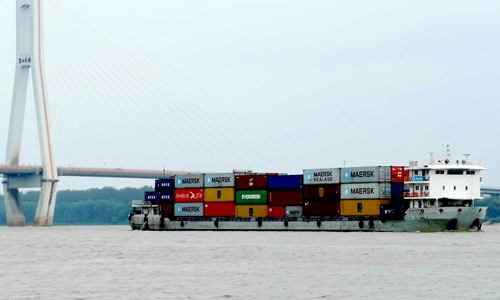RCEP set to be signed in 2020; agreement remains open for India
Source:Global Times Published: 2020/6/24 0:23:24

Cargo ships pass through the Wuhan Junshan Yangtze River Bridge, Central China's Hubei Province, on Saturday. Wuhan, which was hard hit by COVID-19, started lifting outbound travel restrictions on Wednesday after almost 11 weeks of lockdown. China's Ministry of Commerce said on Thursday about 76 percent of domestic key foreign trade companies had resumed work using over 70 percent of capacity. Photo: IC
Members of the Regional Comprehensive Economic Partnership (RCEP) said on Tuesday that the signing of the agreement this year will increase regional integration and the door is still open for India whenever it's ready.
"We reaffirmed our commitment to sign the RCEP Agreement this year as instructed by the leaders of the RCEP participating countries at the 3rd RCEP Summit on November 4, 2019," read a joint media statement of the 10th RCEP Inter-sessional Ministerial Meeting.
It stressed the importance of signing the agreement amid the global pandemic which poses unprecedented challenges for trade, investment and global supply chains.
"The signing of the agreement will serve as a clear signal of our unwavering support for the multilateral trading system and regional integration as well as economic development across the region," read the statement.
Current RCEP members - countries of the Association of Southeast Asian Nations and Australia, China, Japan, Korea, and New Zealand - also emphasized that the regional agreement remains open for India.
"India has been an important participant in the RCEP negotiations since the launch in 2012. We believe that India's participation in the RCEP would contribute to the advancement and prosperity of the region," it said.
As a member of the RCEP and second-largest trade partner of India, China also welcomes India to join the pact, Qian Feng, director of the research department at the National Strategy Institute at Tsinghua University, told the Global Times on Tuesday.
"The Chinese and Indian economies are highly complementary and long-term sound bilateral economic and trade cooperation prospects will not be impacted by calls for decoupling on the Indian side due to border skirmishes," Qian said.
Some Indians have called for a boycott of Chinese products, while Indian officials said they plan to impose higher duties on about 300 types of goods imported from China, according to media reports.
"This absurd behavior goes against economic principles," Qian said, noting that Indian people have benefitted a lot from cheap and good quality Chinese goods over the past decade.
Trade between China and India grew 1.6 percent year-on-year to reach 639.5 billion yuan ($90.51 billion) in 2019, data from the Chinese General Administration of Customs showed.
Global Times
Posted in: ECONOMY